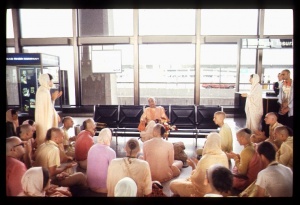SB 7.10.69: Difference between revisions
m (1 revision(s)) |
(Vanibot #0018 edit: make synonym terms in Sanskrit italic in SB - Vanisource) |
||
| Line 1: | Line 1: | ||
{{info | {{info | ||
|speaker= | |speaker=Nārada Muni | ||
|listener=King | |listener=King Yudhiṣṭhira | ||
}} | }} | ||
[[Category:Srimad-Bhagavatam - Canto 07 Chapter 10]] | |||
[[Category:Bhagavatam Verses Spoken by Narada Muni - Vanisource|071069]] | |||
<div style="float:left">'''[[Srimad-Bhagavatam]] - [[SB 7|Seventh Canto]] - [[SB 7.10: Prahlada, the Best Among Exalted Devotees|Chapter 10: Prahlāda, the Best Among Exalted Devotees]]'''</div> | |||
<div style="float:right">[[File:Go-previous.png|link=SB 7.10.68]] '''[[SB 7.10.68]] - [[SB 7.10.70]]''' [[File:Go-next.png|link=SB 7.10.70]]</div> | |||
{{RandomImage}} | |||
==== TEXT 69 ==== | ==== TEXT 69 ==== | ||
<div | <div class="verse"> | ||
evaṁ dagdhvā puras tisro | :evaṁ dagdhvā puras tisro | ||
bhagavān pura-hā nṛpa | :bhagavān pura-hā nṛpa | ||
brahmādibhiḥ stūyamānaḥ | :brahmādibhiḥ stūyamānaḥ | ||
svaṁ dhāma pratyapadyata | :svaṁ dhāma pratyapadyata | ||
</div> | </div> | ||
| Line 17: | Line 22: | ||
==== SYNONYMS ==== | ==== SYNONYMS ==== | ||
<div | <div class="synonyms"> | ||
''evam''—thus; ''dagdhvā''—burning to ashes; ''puraḥ tisraḥ''—the three residences of the demons; ''bhagavān''—the supreme powerful; ''pura-hā''—who annihilated the residences of the asuras; ''nṛpa''—O King Yudhiṣṭhira; ''brahma-ādibhiḥ''—by Lord Brahmā and other demigods; ''stūyamānaḥ''—being worshiped; ''svam''—to his own; ''dhāma''—abode; ''pratyapadyata''—returned. | |||
</div> | </div> | ||
| Line 24: | Line 29: | ||
==== TRANSLATION ==== | ==== TRANSLATION ==== | ||
<div | <div class="translation"> | ||
O King Yudhiṣṭhira, thus Lord Śiva is known as Tripurāri, the annihilator of the three dwellings of the demons, because he burnt these dwellings to ashes. Being worshiped by the demigods, headed by Lord Brahmā, Lord Śiva returned to his own abode. | O King Yudhiṣṭhira, thus Lord Śiva is known as Tripurāri, the annihilator of the three dwellings of the demons, because he burnt these dwellings to ashes. Being worshiped by the demigods, headed by Lord Brahmā, Lord Śiva returned to his own abode. | ||
</div> | </div> | ||
__NOTOC__ | |||
<div style="float:right; clear:both;">[[File:Go-previous.png|link=SB 7.10.68]] '''[[SB 7.10.68]] - [[SB 7.10.70]]''' [[File:Go-next.png|link=SB 7.10.70]]</div> | |||
__NOTOC__ | |||
__NOEDITSECTION__ | |||
Revision as of 05:34, 1 December 2017

His Divine Grace
A.C. Bhaktivedanta Swami Prabhupada
A.C. Bhaktivedanta Swami Prabhupada
TEXT 69
- evaṁ dagdhvā puras tisro
- bhagavān pura-hā nṛpa
- brahmādibhiḥ stūyamānaḥ
- svaṁ dhāma pratyapadyata
SYNONYMS
evam—thus; dagdhvā—burning to ashes; puraḥ tisraḥ—the three residences of the demons; bhagavān—the supreme powerful; pura-hā—who annihilated the residences of the asuras; nṛpa—O King Yudhiṣṭhira; brahma-ādibhiḥ—by Lord Brahmā and other demigods; stūyamānaḥ—being worshiped; svam—to his own; dhāma—abode; pratyapadyata—returned.
TRANSLATION
O King Yudhiṣṭhira, thus Lord Śiva is known as Tripurāri, the annihilator of the three dwellings of the demons, because he burnt these dwellings to ashes. Being worshiped by the demigods, headed by Lord Brahmā, Lord Śiva returned to his own abode.